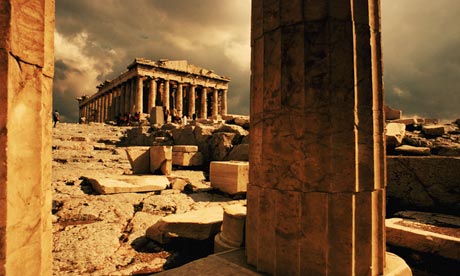Greeks find it hard to trust anyone Promising Salvation
Marinos Diamantides
3/12/2011
It is difficult to understand the economic crisis without getting to grips with Greece’s broader cultural identity.
As Carl Schmitt has shown, forms of political organisation correspond to metaphysical images of the world. Nowhere is this better demonstrated than the current political and economic malaise of Greece.
The history of occidental democracies is the story of educated and affluent Protestants gradually diverting popular reverence from landed nobility and the divine right of western kings to the right to own and utilise property for profit. In secular polities, belief in salvation through obedience to the omnipotent God’s will on Earth is not eliminated but transformed; “God”, originally a mysterious maker (as he still is in Judaism, eastern Christianity and Islam), became something terrestrial if equally abstract: the nation, the market or the revolutionary mass.
The old God sanctioned the king to act as Christ, and suffer for the benefit of his people before bouncing back; the market-god and its plebeian rival expected the same from government with bourgeois liberty and social justice vying for the role of the holy spirit. Today, worshippers of the omnipotent market and of the masses seem ready to dispense with the services of any government-as-Christ. Salvation will come through the will “of the market” or of the “people” directly materialising itself.
Only in occidental politics does “salvation” come when the will of an omnipotent master (first nobility, then God, then national government, then the “market” or the “people”) is served inside what St Augustine called the city of man, namely here on earth and through economic activity. In orthodox states salvation is attained rather by withdrawing – in a desert cave or monastery if you are religious or in small social networks if you are secular.
Work is a means for unholy enjoyment and is certainly not equated with spiritual salvation individual or collective. The Aristotelian view that the primary meaning of economics is the action of using things required for the good life (ie economy is not valuable in itself) is read together with the Orthodox Christian view that the only good life is the afterlife.
The Greek bourgeoisie, by evading taxation and thus sabotaging governmental authority, is ahead of western capitalists who achieve the same through elaborate offshore schemes. And the savaged people look suspiciously to occidental saints and secular do-gooders who are found – or would love to find themselves – not in caves but in places of power: from medieval Franciscan monks to modern marketers and their apologists like John Locke and Adam Smith but also their Marxist opponents for whom the materiality of anonymous masses is a source of salvation-power as supreme as that of the market god.
The bickering of Greek politicians goes hand in hand with the deep distrust of Greeks in their republic. Occidental governments have always been presumed to be legitimate but the Greek view of government remains partly Byzantine in the sense that accession to power is never quite effectively endorsed as blessed, rightful or just. Byzantine emperors were always suspected as usurpers of power: there was no imperial succession through blood and accession to power was explicitly the result of conflict or intrigue.
To make up for their lack of legitimacy, emperors claimed to also be priests but the ruse never quite worked as expected, leaving them with a permanent legitimacy deficit. Anyway, for the Orthodox fathers this word would not ever get better and those who wish to convince us they will make it so are suspect. The 400 years of absolutist Muslim and Ottoman rule that followed further entrenched the Greek suspicion of government.
In modern Greece, except for the rare occasions when a particularly charismatic politician first ran for office, elections at best produce a consensus that the winner must be left to rule for the time being but, just as it happened with Byzantine coronation rituals, do not remove a certain charge of “violence”. Elections prolong or mime the conflict, conspiracy and demagoguery that brought the new government to power.
Politicians pretending that politics is not about conflicting desires but about collective salvation are seen as seeking power for power’s sake. In good times, Greeks tolerate would-be saviours; in bad times they raise an open palm towards their government and their nation-state symbols, a Byzantine cursing gesture which effectively means: “liars and imbeciles for promising salvation!”
Occidental governments, therefore, live on “bourgeois credit” in more than one sense, money and faith; Greek ones survive an analogous double deficit. Their fiscal deficits have now been revealed but it may be more difficult for non-Greeks to realise just how little Greeks trust anyone promising salvation.


803021 294770Some truly great content material on this internet web site , appreciate it for contribution. 993897